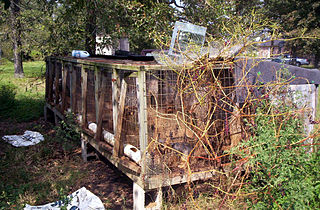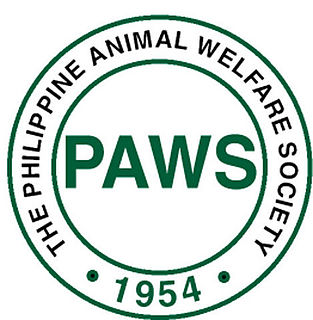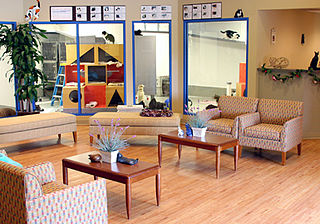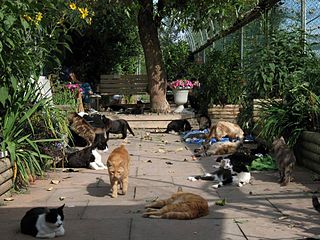
Pet adoption is the process of transferring responsibility for a pet that was previously owned by another party such as a person, shelter, or rescue organization. Common sources for adoptable pets are animal shelters and rescue groups. Some organizations give adopters ownership of the pet, while others use a guardianship model wherein the organization retains some control over the animal's future use or care.

An animal shelter or pound is a place where stray, lost, abandoned or surrendered animals – mostly dogs and cats – are housed. The word "pound" has its origins in the animal pounds of agricultural communities, where stray livestock would be penned or impounded until they were claimed by their owners.

A puppy mill, also known as a puppy farm, is a commercial dog breeding facility characterized by quick breeding and poor conditions. Although no standardized legal definition for "puppy mill" exists, a definition was established in Avenson v. Zegart in 1984 as "a dog breeding operation in which the health of the dogs is disregarded in order to maintain a low overhead and maximize profits". The Veterinary Medical Association of the Humane Society of the United States defines the main characteristics of a puppy mill as "emphasis on quantity over quality, indiscriminate breeding, continuous confinement, lack of human contact and environmental enrichment, poor husbandry, and minimal to no veterinary care."
The Anti-Cruelty Society is an animal welfare organization and animal shelter in the River North neighborhood of Chicago, Illinois. The Anti-Cruelty Society is a private, not-for-profit humane society that does not receive government assistance. It is one of the largest such organizations in the United States. The organization offers adoption, veterinarian, and training services.
An animal rescue group or animal rescue organization are dedicated to pet adoption. These groups take unwanted, abandoned, abused, or stray pets and attempt to find suitable homes for them. Many rescue groups are created by and run by volunteers, who take animals into their homes and care for them — including training, playing, handling medical issues, and solving behaviour problems — until a suitable permanent home can be found.
A backyard breeder is an amateur animal breeder whose breeding is considered substandard, with little or misguided effort towards ethical, selective breeding. Unlike puppy mills and other animal mill operations, backyard breeders breed on a small scale, usually at home with their own pets, and may be motivated by things such as monetary profit, curiosity, to gain new pets and/or working animals, or to show children "the miracle of birth".
Overpopulation in domestic pets is the surplus of pets, such as cats, dogs, and exotic animals. In the United States, six to eight million animals are brought to shelters each year, of which an estimated three to four million are subsequently euthanized, including 2.7 million considered healthy and adoptable. Euthanasia numbers have declined since the 1970s, when U.S. shelters euthanized an estimated 12 to 20 million animals. Most humane societies, animal shelters and rescue groups urge animal caregivers to have their animals spayed or neutered to prevent the births of unwanted and accidental litters that could contribute to this dynamic.
Operation Kindness is a no kill animal shelter for cats and dogs located in Carrollton, Texas. It is a non-profit organization and is funded through donations, receiving no government funding.
A no-kill shelter is an animal shelter that does not kill healthy or treatable animals even when the shelter is full, reserving euthanasia for terminally ill animals or those considered dangerous to public safety. A no-kill shelter uses many strategies to promote shelter animals; to expanding its resources using volunteers, housing and medical protocols; and to work actively to lower the number of homeless animals entering the shelter system. 10% of animals can be killed in a no-kill shelter and still be considered a no-kill shelter.
North Shore Animal League America, headquartered in Port Washington, New York, is the largest no-kill animal rescue and adoption organization in the world. Marianne H. Sanders founded the League in 1944, and the League's mission has been saving the lives of pets through adoption, rescue, spay/neuter and advocacy initiatives. Each year, the League rescues, nurtures and adopts nearly 20,000 pets nationwide, and to date, has placed nearly one million puppies, kittens, cats and dogs into screened homes. One of the first animal rescue agencies on the ground in the aftermath of Hurricanes Katrina and Rita, the League rescued more than 1,400 pets from the region.

For the Bay Area shoe company, see Rocket Dog

The Philippine Animal Welfare Society (PAWS) is a volunteer-based, non-government organization whose goal is to prevent animal cruelty through education, animal sheltering and advocacy, based in Quezon City, Philippines. PAWS believes that the creation of a more peaceful society starts with the widening of mankind's circle of compassion which includes animals, thereby envisions a nation that respects animals, practices responsible pet ownership and protects wildlife. The volunteer-based organization rehabilitates these animals in the hope of finding them new homes and a second chance at a good life. PAWS does not take in pets of other people, but only victims of cruelty or neglect where the animal offenders are charged with violation of the Animal Welfare Act in court.
Feline vaccination is animal vaccination applied to cats. Vaccination plays a vital role in protecting cats from infectious diseases, some of which are potentially fatal. They can be exposed to these diseases from their environment, other pets, or even humans.
Pediatric spaying or neutering is defined as performing an ovariohysterectomy (spaying) or orchidectomy on a kitten or puppy between the ages of 6 and 14 weeks. Spaying and neutering are sterilization procedures which prevent the animals from reproducing. The procedures are also referred to as “gonadectomies” in the veterinary literature.

Tabby's Place is a cat sanctuary situated in Ringoes, New Jersey, United States. Opened in 2003, it can house approximately 100 cats, which come primarily from high-volume public animal shelters where they have been scheduled to be killed.

Pound Puppies is an animated children's television series that premiered on the Hub Network on Sunday, October 10, 2010, in the United States. Pound Puppies also aired on YTV in Canada and on Boomerang in the UK, Ireland and Australia. The series is produced by Hasbro Studios. It was the second series, after the 1986 series, to adapt Pound Puppies into a cartoon format.
The Vancouver Orphan Kitten Rescue Association (VOKRA) is a no kill, non-profit cat rescue organization in Vancouver, British Columbia, Canada, providing trap-neuter-return services to Vancouver and nearby communities.

Richmond Animal Protection Society (RAPS) is a no kill animal services agency in Richmond, British Columbia, Canada. RAPS operates the city animal shelter, a cat sanctuary, a fostering network, and a full-service animal hospital.

PAWS Chicago is a non-profit animal shelter organization based in Chicago, Illinois. The organization was co-founded in 1997 by Paula Fasseas and her daughter Alexis Fasseas. The duo aspired to create an organization that focused on discovering solutions to end the euthanasia of homeless pets.

Animal Kingdom Foundation or simply AKF, is a non-profit animal welfare non-governmental organization based in the Philippines. Founded in 2002, it is committed to "improving the living and welfare conditions of animals", eliminating the trade of dog meat for human consumption in the Philippines, the protection and promotion of animal welfare by advocating an improvement to their living conditions, and by campaigning to eliminate causes that bring about pain and discomfort to the animals.










